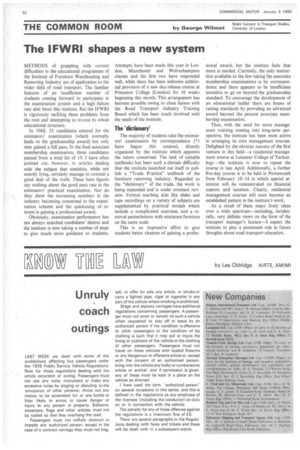The IFWR1 shapes a new system
Page 54

If you've noticed an error in this article please click here to report it so we can fix it.
METHODS of grappling with current difficulties in the educational programme of the Institute of Furniture Warehousing and Removing Industry are of application to the wider field of road transport. The familiar features of an insufficient number of students coming forward to participate in the examination system and a high failure rate also beset this institute. But the IFWRI is vigorously tackling these problems from the root and attempting to re-cost its whole educational structure.
In 1968, 55 candidates entered for the estimators' examination (which normally leads to the graduateship award) but only nine gained a full pass. In the final associate membership examination, three candidates passed from a total list of 19. I have often pointed out. however, in articles dealing with the subject that statistics, while not exactly lying, certainly manage to conceal a pod deal of the truth. These bare figures say nothing about the good pass rate in the estimators' practical examination. Nor do they show the increasing numbers in the industry becoming concerned in the examination scheme and the quickening of, interest in gaining a professional award.
Obviously, examination performance has not always matched candidates' desires and the institute is now taking a number of steps to give much more guidance to students. Attempts have been made this year in London, Manchester and Wolverhampton classes and the first two have responded well, while there has been welcome additional provision of a new day-release course at Princeton College (London) for 16 weeks beginning this month. This arrangement has become possible owing to close liaison with the Road Transport Industry Training Board which has been much involved with the needs of the institute.
The 'dictionary' The majority of students take the estimat, ors' examination by correspondence 01 have begun this session), directly organized by the institute which appoints the tutors concerned. The lack of suitable textbooks has been such a chrOnic difficulty that the institute launched out itself to publish a "Trade Practice" textbook of the furniture removing industry. Regarded as the "dictionary" of the trade, the work is being expanded and is under constant revision. Formal teaching aids like slides and tape recordings on a variety of subjects are supplemented by practical models which include a complicated staircase, and a removal pantechnicon with miniature furniture on the same scale.
This is an impressive effort to give students better chances of gaining a profes
sional award, but the institute feels that more is needed. Currently, the only instruction available to the few taking the associate membership examinations is by correspondence and there appears to be insufficient incentive to go on beyond the graduateship standard. To encourage the development of an educational ladder there are hopes of raising standards by providing an advanced award beyond the present associate membership examination.
Thus, with the need for more management training coming into long-term perspective, the institute has been most active in arranging its own management courses. Delighted by the obvious success of the first venture in this field—a residential management course at Leicester College of Technology—the institute is now to repeat the course in late April. Additionally, a further five-day course is to be held in Portsmouth from February 10-14 in which special attention will be concentrated on financial aspects and taxation. Clearly, residential management courses will soon become an established pattern in the institute's work.
As a result of these many lively ideas over a wide spectrum—including, incidentally, very definite views on the form of the transport manager's licence—I expect the institute to play a prominent role in future thoughts about road transport education.




























































































